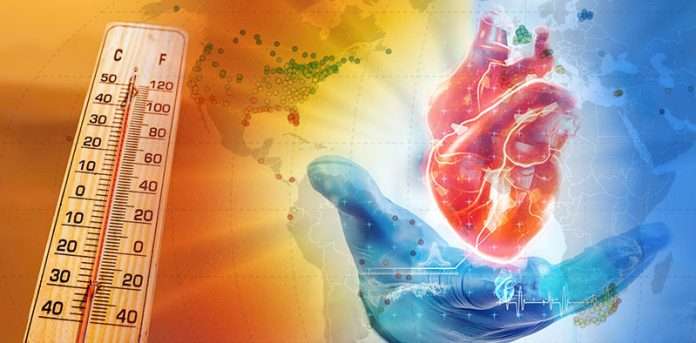A new report shows that with average temperatures during summer increasing annually, people living in inherently hot regions of the world may be at particularly high risk of death from heat-related cardiovascular diseases (CVD).
The study suggests that when daily temperatures average over 43 degrees centigrade, the number of deaths from cardiovascular disease could double or triple. In their study published in ‘Circulation’, the premier journal of the American Heart Foundation, researchers note that these findings raise concerns that traditionally hot regions may be vulnerable to heat-related cardiovascular deaths.
The highest temperature on earth in the last 76 years, of 54 degrees centigrade, was recorded in Kuwait in the summer of 2016. Peak summer temperatures have hovered around this record figure in subsequent years. In 2021, the average maximum temperature in Kuwait reached an all time high of 34.5 degrees centigrade.
Given the consistently high temperatures in Kuwait, researchers behind the new study examined the relationship between temperature and more than 15,000 cardiovascular-related deaths in the country. All death certificates in Kuwait from 2010 to 2016 that cited ‘any cardiovascular cause’ for death, among individuals ages 15 and older were reviewed in the study. The study found that when the number of deaths on days when the average daily temperature was 34.5 degrees centigrade, was compared to the number of deaths when daily temperatures averaged around 43 degrees centigrade, there was:
- Overall, a 3-times greater risk of dying from any cardiovascular cause
- Men were more affected by the extreme temperatures, experiencing a 3.5 times higher death rate
- The death rate among women was nearly 2.5 higher;
- Working-age people (ages 15-64 years) had a death rate 3.8 times higher
- The death rate was just over 2-times higher for people 65 and older.
To examine the effects of temperature on its own, the investigators adjusted for other environmental factors such as air pollution and humidity. They found that higher temperatures affected both genders and all ages differently.
While cardiologists and other medical doctors have rightly focused on traditional risk factors, such as diet, blood pressure and tobacco use, climate change and subsequent higher average temperatures, especially in very hot regions of the world, may exacerbate the burden of cardiovascular mortality,” said Barrak Alahmad, MD, MPH, Phd, who holds a medical degree from the University of Liverpool, United Kingdom, a Master of Public Health (MPH) from the Johns Hopkins Bloomberg School of Public Health, and a PhD in Population Health Sciences from the Harvard T.H. Chan School of Public Health in the United States.
When core body temperature increases, the human body tries to cool itself by shifting blood from the organs to underneath the skin. This shift causes the heart to pump more blood, putting it under significantly more stress. A collaborative group of cardiologists, environmental health specialists and epidemiologists hypothesized that increasing temperatures in hotter regions of the world could lead to increased CVD deaths due to extreme heat’s effects on the body.
“The warming of our planet is not evenly distributed. Regions that are inherently hot, like Kuwait and the Arabian Peninsula, are witnessing soaring temperatures unlike ever before. We are sounding the alarm that populations in this part of the world could be at higher risk of dying from cardiovascular causes due to heat,” said Alahmad. “Although we cannot conclude from this analysis, men and working-age people may have been at greater increased risk because of spending more time outside. We need to explore this relationship further and consider serious preventive strategies that could reduce the impact of rising temperatures on our health,” he added.
The study was limited by only examining any cardiovascular cause of death, so it is not known whether any specific type of heart problem is more susceptible to the influence of extreme heat. Although the researchers found a strong association between extremely high temperatures and increased cardiovascular deaths, they acknowledged that further research would be needed to establish a true cause and effect relationship.

















